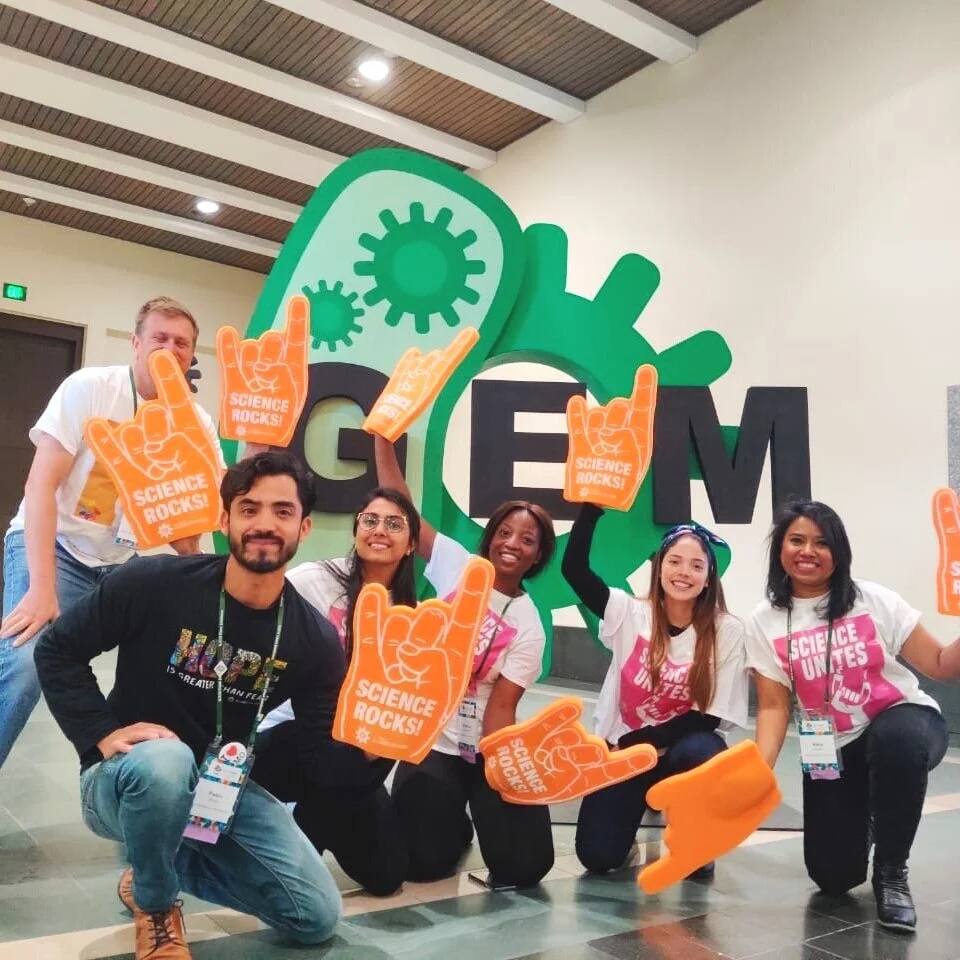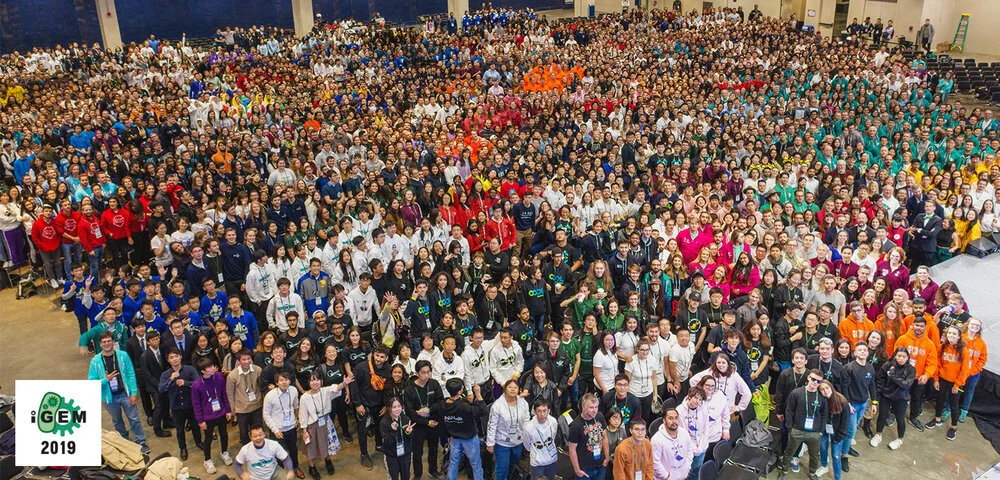Science Rocks at iGEM!
by Pablo Orozco (GuatemaLA), Ian Gazard (USA), Navneet Kaur (India)
and Sabrina Marecos (Paraguay)
As you read this, please cue singer St. Vincent or your favorite guitar artist and imagine them shredding to these words. That gives you a sense of the mood at the iGEM 2019 Giant Jamboree, where young synthetic biologists from all over the planet showcased the amazing future that science is ushering in.
A team of us from Cornell Alliance for Science (AfS) attended the event as exhibitors, setting up a booth in the Hynes Convention Center in Boston to interact, learn and begin collaborating with the amazing iGEMers who envision a world where synthetic biology fights crop disease and the effects of climate change and generally improves human life.
At AfS, we know that new biotechnological innovations in agriculture can help us bring drought-tolerant seeds, pest-resistant crops and all-around climate-smart agriculture to the parts of the world that need them most. Our Cornell University-based global communications initiative seeks to empower champions across all fields to create a global network of farmers, scientists and other advocates who support science-based decision-making.
Cornell Alliance for Science team at the iGEM 2019 Giant Jamboree, via AfS
That’s why our booth displayed a huge “Science Rocks” banner and why we enjoyed the event so much. I can’t think of another competition that exemplifies this mantra as much as the iGEM Jamboree. We talked to many student teams, learning about all their hard work on how to use science to change the world.
Throughout the weekend, we interacted with so many young scientists who share our interest in science communication and our vision of what science should really be about. As students passed by our booth, they told us about the different approaches using synthetic biology they utilized to solve local issues. We heard many innovative and inspiring stories that have the potential to impact the real world in a multitude of ways.
Wearing a full-body “Purple Grape” suit, Marijn Ceelen made us care about his story. He described the devastating disease caused by Xylella fastidiosa bacterium in economically important crops, such as grapevines and olives, in Europe. His team, Wageningen UR from the Netherlands, developed a bacteriophage therapy named Xylencer against X. fastidiosa using the modern biotechnology tool CRISPR-Cas to efficiently eradicate and stop X. fastidiosa’s spread. This therapy is a sustainable alternative to the toxic pesticides now commonly used.
Representative from team Wageningen UR at the Cornell Alliance for Science booth, via AfS
The EPFL team from Switzerland also proposed using synthetic biology to help farmers manage pest diseases. Their project consisted of producing a system that allows winegrowers to quickly diagnose the symptoms of grapevine yellowing, among other pest diseases. This helps growers to identify and remove infected plants early on, thereby significantly reducing the chance for the disease to spread.
The University of Calgary team demonstrated an inexpensive, environmentally friendly, protein-based emulsion system to address the green seed problem in processing canola oil. The resulting green waste, which contains chlorophyll, was further used to produce pheophorbide, a commercially important antifungal compound.
Australia’s Macquarie team designed an E.coli-based biosensor with a fluorescent signaling system to detect unsafe hydrogen gas concentrations in coal mines or during gas pipeline leakage.
The Cornell University team developed an RNA aptamer-based colorimetric biosensor to detect algal blooms and an engineered bacteria-based filter to remediate. They’re using their invention to do remediation in the Finger Lakes that are near their New York campus.
“Bee-free honey” by the Technion-Israel team could create a revolution in the honey industry. By mimicking the environment of a bee’s stomach, they created small, membrane-based capsules that used engineered bacteria to produce a compound with real honey properties from a nectar-like solution.
We see eye-to-eye with the teams that focused on helping farmers around the world use technology to fight pests, climate change and improve their livelihoods. Part of our goal at the Alliance is to promote scientific innovations concerning agriculture, so we were pleasantly surprised to find them in the winners’ circle.
We also strongly relate to the many students who expressed the difficulties they had in addressing the human practices component of their projects because they were not familiar with the science communication factors that it entails.
iGEM teams visiting the Cornell Alliance for Science, via AfS
The iGEM competition’s Human Practices component aligns perfectly with our own outreach and engagement vision. In the past, science hasn’t been directly connected to the social aspect of its inventions. But iGEM amplifies this critical issue. By facilitating an open dialogue to build a more sustainable relationship between science and society, iGEM is helping the next generation of synthetic biologists to become more aware of the need to engage the general public and listen to their diverse inputs.
The students of today are the game-changers of tomorrow. The Alliance for Science supports iGEM’s drive to make sure that our upcoming synthetic biologists seek to create positive societal impacts through the application of their science, while taking into account the ethical, legal, societal, safety, security and economic implications of their work.
Our participation in iGEM left us fulfilled and joyful as we witnessed this emerging shift in the development of scientific innovations through a more holistic approach.
When it comes to new technology, we believe that “hope is greater than fear.” At iGEM, we got a preview of the hopeful future we want to invest in: bright and enthusiastic young minds from different fields championing, with remarkable insight, the benefits that synthetic biology can provide.
The world desperately needs young scientists who are eager to solve the biggest challenges of our time. At iGEM, we found a new generation that is not afraid to work together to find a unifying new narrative for agricultural biotech, spearheaded by synthetic biology.
This blog post is a guest contribution by an exhibitor at the 2019 iGEM Giant Jamboree. Learn more about exhibitor opportunities at iGEM.









